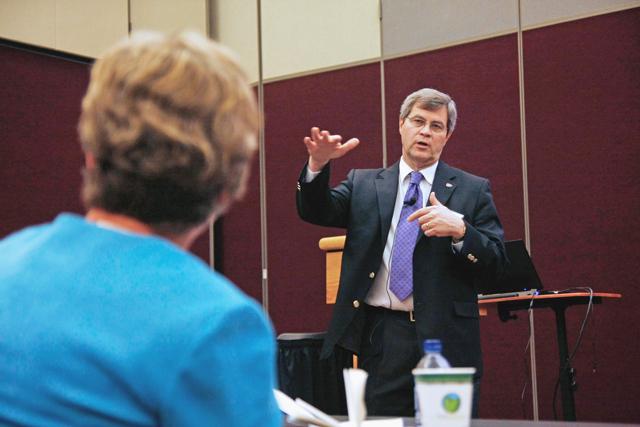 " />
" />
© 2011 N.C. State Student Media.
Talking about the environmental, social, and economic benefits of no-till farming, Charles Rice, Kansas State professor of soil microbiology, presents at the Nusbaum Conference at the McKimmon Center Thursday, March 31. Rice focused on the tangible economic benefits that come with environmentally responsible farming practices. "Farms make $2,000 a year per turbine and they can farm under it. Put 30 of them up and that's a legitimate income," Rice said. Photo by Tim O'Brien.
Recognizing the threat of climate change to current agricultural practices, the commemorative Nusbaum conference sought to create a dialogue by hosting speakers from around the country.
The conference, hosted by James Moyer, department head of plant pathology, is supported by an endowment established by the late William N. Reynolds Distinguished Professor C.J. Nusbaum and his wife, Virginia.
Michael Specter, an award-winning writer for the New Yorker was one of these speakers, and addressed whether it is possible to combat world hunger.
“We can definitely do it; we have had this discussion since forever, about whether we can feed our population or not. It is only now due to the threats of climate change that we are asking this again. However, keeping these problems in mind, we do need to do something radical now,” Specter said. “World hunger is bad. It is immoral—but it should stop. It is a very complex issue that we need to think about.”
The major part of Specter’s discussion focused on embracing the benefits provided by modern science and putting into effect existing solutions to battle climate change in agriculture.
“We have three different systems in academia, the corporate sector and the government. The academics can change a lot about the way we think and go about doing things, because that is what they are supposed to do,” Specter said, “I often see people pitting genetically modified crops against organic [crops] and making arguments for either side. Why is that? They should embrace each other.”
Giving the example of Aspirin’s side-effects as a drug, he argued for the benefits of science, and that some side-effects of the drug are not sufficient reason for people to stop using it.
“If I give everybody in America an aspirin today, 300 people will surely die due to that,” Specter said, “But is that sufficient reason for us to ban the drug, considering it kills about 300, from a population of over 300 million? We should be thinking about that only if it also does not cure anyone, which we know it does.”
Following the recent natural and nuclear disasters in Japan, Specter said he was unsure of whether nuclear energy had a bright future in the country, though he said it shouldn’t be completely rejected as a potential energy source.
“I hope I’m wrong, but after looking at what happened in Japan, it seems unlikely that we will be seeing a lot of nuclear energy here in the future,” Specter said, “However, we must realize that nuclear is a part of the solution and not the problem. Everything comes with risk, but we need to look at the benefits along that as well.”
Specter also pointed out the need for the scientific community to communicate better with the society.
“We need to do a better job of explaining what we want,” Specter said, “Tell stories about what you do, tell them how you did it. If you screw up, tell people about it, but find a way to communicate more efficiently with others.”
Specter said he believes every scientist should be able to explain to anyone the nature of their work.
“You should be able to explain to someone who does not understand much about science what it is that you do in the lab and how it helps people,” Specter said, “If you cannot do that, frankly, you do not deserve to be a scientist or someone who receives a lot of funding for their work.”
Moyer also said he believes the scientific community needs to be more focused on how it presents itself.
“We are at a point when doing the job is not enough,” Moyer said. “Part of the responsibility is to get our story out. It is not that we need to do more, but that we need to be more effective.”
Kestrel Lannon, a second-year graduate student in plant pathology, said this event drove home the importance of effective communication.
“I attended all the four sessions and they were all very interesting talking about the problems we face today,” Lannon said, “I agree that scientists struggle with communicating with the society in general, and we need to get better at that. We can always improve.”